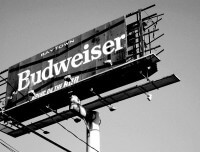 As it turns out, my previous post on the Wall Street Journal review of Bitter Brew should have mentioned the October 25 BusinessWeek magnum opus by Devin Leonard, “The Plot to Destroy America’s Beer.” It’s a lengthy read but important for those of us who care deeply about our beer.
As it turns out, my previous post on the Wall Street Journal review of Bitter Brew should have mentioned the October 25 BusinessWeek magnum opus by Devin Leonard, “The Plot to Destroy America’s Beer.” It’s a lengthy read but important for those of us who care deeply about our beer.
Sure, American Budweiser isn’t the same as Budvar from the Czech Republic. I expected that. But following InBev’s takeover, it turns out Beck’s is now being brewed in St. Louis—and it tastes different:
One Friday night in January, [Brian] Rinfret, who is now 52, stopped on the way home from work at his local liquor store in Monroe, N.J., and purchased a 12-pack of Beck’s. When he got home, he opened a bottle. “I was like, what the hell?” he recalls. “It tasted light. It tasted weak. Just, you know, night and day. Bubbly, real fizzy. To me, it wasn’t German beer. It tasted like a Budweiser with flavoring.”
And that’s just the intro to the piece. Wait til you get to Bud Light Lime-A-Rita and Michelob Ultra Dragon Fruit Peach. When I visited Chicago last year, locals were complaining about their beloved Goose Island brewery selling out to AB InBev and how they would boycott the beer from now on. It struck me as an overreaction driven by pretentiousness. But as Leonard writes,
Three months after the deal, AB InBev started brewing Goose Island signature 312 Imperial Pale Ale—named after a Chicago area code—in Baldwinsville, N.Y., where the area code is 315. Graham Haverfield, beer director at the Wine Library in Springfield Township, N.J., says he’s received an IPA made in Portsmouth, N.H.; a harvest ale made in upstate New York; and Belgian-style beers from Goose Island’s Chicago brewery.
This creates problems for Haverfield. “If I’m asked upfront by a customer, ‘Have you had this?’ Well, I don’t know,” he sighs. “The last time I had it, it was brewed in a different place.” He’s still a Goose Island fan, but he doesn’t know what AB InBev is doing with it. “I have a problem with a craft beer like Goose Island being treated like a mass-produced brand,” Haverfield says. “It’s a slippery slope.” [AB InBev spokeswoman Laura Vallis] disagrees: “We want Goose Island to grow in a way that’s right for the brewery and the brands.”
Hat tip: Ethan Epstein; photo by Baytownbert